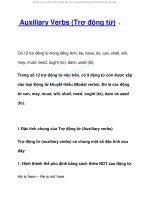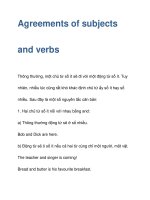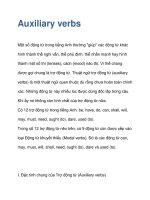Some equivalents of modal auxiliary verbs
Bạn đang xem bản rút gọn của tài liệu. Xem và tải ngay bản đầy đủ của tài liệu tại đây (12.2 KB, 1 trang )
Some equivalents of modal auxiliary verbs
Be able to instead of can and could
He is able to do it on his own. (= He can do it on his own.)
The watchman was able to catch the thief. (= The watchman could catch the thief.)
She was able to solve the problem. (= She could solve the problem.)
Be to instead of will/shall
He is to retire next year. (= He will retire next year.)
We are to have a test in English next week. (= We will have a test in English next week.)
The structure ‘be to’ indicates simple future, like will or shall, but with a slight degree of uncertainty. The
sentence ‘He is to retire’ means that ‘He is likely to retire’. It is not quiet certain whether he will actually retire or
not.
Be to may also express a stronger meaning, almost like must, but it is not quite strong or blunt.
You are to take this medicine whether you like it or not.
Had better instead of should or ought to
You had better consult a doctor. (= You should consult a doctor.)
Had better may also express a threat.
He had better mend his ways.
Have to and have got to instead of must
I have to report for duty within a week. (= I must report for duty within a week.)
I have got to talk to her. (= I have to/must talk to her.)
Did you have to do that? (was that necessary?)
Have got to means the same as have to in most situations. It is more common in an informal style.
Stay on top of your writing! Download our grammar guide from www.englishgrammar.org to stay up-to-date.
Powered by TCPDF (www.tcpdf.org)









